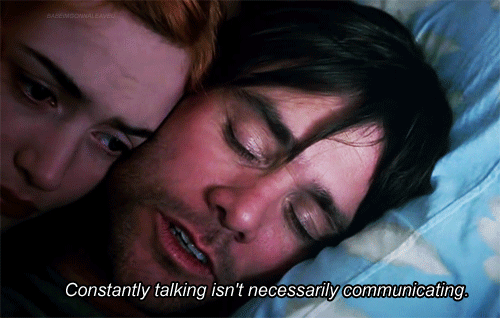I studied abroad in Buenos Aires and quickly made friends with the other Americans who were set to be there for the entire school year. Jared (not his real name) was among them. He was sporty, goofy, and mischievous, and my friend group liked to have him around. We sent him a constant stream of invitations: tango lessons, Argentine parilla restaurants for a steak, weekend trips to art fairs and museums. Jared often declined or didn’t answer the texts at all.
He had a girlfriend back in the States, and they spent evenings together on Skype. I couldn’t help but feel that he was missing out on both experiences, but it wasn’t my place to say so. His dates with his girlfriend were virtual and two-dimensional. They’d watch the same TV show simultaneously while video-chatting. That meant that he would stay in his apartment and ignore the bustle of a foreign city. We encouraged him to stop missing the movies, dinners, plays, and day trips we were taking. And finally, it seemed, Jared got the memo.
He RSVPed yes to a birthday party. It was the whole shebang: dinner, pregame, dance club. Then, while we were all out, Jared ended up sneaking off with another girl. I’m not sure if he ever told his girlfriend about it or not, but after that night, he returned to his Skype dates (a schedule more rigid than before), and I hardly saw him again.
Our year in Argentina came to an end, and our friend group headed back to the States to finish our bachelor’s degrees. A couple of months later, Jared and I caught up over Facebook. He and his girlfriend had broken up, he told me. After a year apart, they didn’t have much in common in person.
On the other extreme, I have another friend—we’ll call her Zoe. She had been dating her boyfriend for just over a year when she left to study abroad in Melbourne, Australia, for a semester. They decided to stay together, though they elected to have an open relationship. They set rules for themselves, and it worked for them. Six years have passed since then, and they’re getting married this October.
So, what can you do to help your relationship last when you’re studying abroad? Every couple is different, but you can start with these steps:
1. Define the relationship.
If you’re entertaining any ideas about studying abroad, let your partner know. You picking up and leaving for a semester or two shouldn’t come as a surprise, so don’t throw your significant other any curveballs. Talking about your plans in advance will also give the both of you more time to tackle the hard questions.

Eternal Sunshine of the Spotless Mind / Giphy
- Do we want to continue our relationship while one of us is far away?
- How long will we be apart?
- Do we plan on seeing each other in the middle of that time?
- Will we remain exclusive?
- How are we going to communicate? Are we going to schedule calls for specific times?
- How do we find the perfect balance between keeping in touch and living in the present? Are we willing to adapt to changing schedules and travel?
- Are we going to be able to trust each other?
- What do we expect from the relationship when we get back together after the study abroad term?
2. Keep your significant other in the loop.
Have regular Skype dates or calls to keep in touch. Successful long-distance relationships rely on communication, so share with each other and make the other feel included. If you’re the one studying abroad, talk about your new friends and experiences. If you’re the one still on campus or at home, talk about your everyday life, even if you think it seems boring in comparison to what your partner is doing. Your partner genuinely wants to know what’s up, even if it seems like the same ol’, same ol’ to you.
3. Make plans for when you’ll be reunited.
Check the date of your (or your partner’s) return flight, and start thinking about what you want to do when you’re back together. You might consider getting tickets for a sports game, concert, or play. Make a reservation at the fancy restaurant in town that fills up a month in advance. Plan a day trip or a seasonally appropriate adventure. Will you be reunited in December? Great! Look forward to ice skating, New Year’s Eve, and sledding. Coming home in May or June? Spend some time googling swimming holes near your town and send the list to your significant other.
4. Don’t let yourself feel guilty.
If you’re the one studying abroad, it’s possible that you have a dozen new friends who are inviting you to explore the country and its culture. Be open to those experiences; that’s why you came. If you ever feel guilty (or are made to feel guilty) about enjoying those experiences while your partner is at home, it’s time to reexamine your relationship. A loving partner will want you to make the most of the experience and will understand if you need to reschedule a Skype date every now and then.

Blue's Clues / Giphy
5. Write letters and send care packages.
All of those emails and video-chats are great, but it can be even better to receive something tangible. If you’re abroad, give your significant other a taste of the country. Send chocolates if you’re in Belgium or vegemite if you’re in Australia. Even just a postcard can overjoy your partner. For those of you left at home waiting for your partners to return, send mail too. It’s extraordinarily thoughtful to send a book in English, a collection of notes from friends from home, or a big jar of peanut butter (that stuff is hard to come by outside of the United States). Go out of your way to show your partner you still care.
6. Do something abroad that your partner would do if he or she were there.
If your partner is a dancer, go see a ballet. If your partner brews craft beer, tour a distillery. Whatever you do, take tons of pictures.
7. Plan a visit.
It’s a great idea to invite your significant other to come visit for a week if you’re studying abroad. It’ll give context to your phone calls, your partner can meet your friends and host family, and you’ll get to see each other! But sometimes that’s not entirely feasible. It might be cheaper and more exciting to meet in the middle for a couple’s vacation. If you’re studying abroad for the whole year, you might consider heading home between semesters for a visit.

The Little Mermaid / Giphy
8. Choose a shorter abroad experience.
A lot of students in relationships want to go abroad but don’t want to be away from their partners. Compromise. Study abroad for just a semester or a summer, not the whole year, if you think that missing your partner will interfere with your enjoyment of your study abroad experience.
Make the most of study abroad and the time you’ll be apart. You’ll be reunited as soon as you know it.
-
How to Maximize Your European Vacation
-
Keeping in Touch When You’re Far Away from Home
-
Dressing Respectfully While Traveling Abroad
-
My College Story: Why I Suggest a Gap Year
-
My College Story: The Importance of Studying Abroad
-
My College Story: Taking Chances and Trusting Your Path to Education
-
My College Story: Traveling to Learn and Teach Languages
-
Is Your Relationship Ready for a Study Abroad Term?
-
The Most Popular Locations to Study Abroad
-
My College Story: Living and Teaching English in Chile
-
How to Make the Most out of an Immersion Course Abroad
-
My College Story: From Studying Art History to Law School


